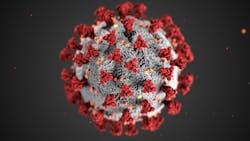Immune imprinting causes varied patterns of protection against COVID-19 variants
Research shows that the first SARS-CoV-2 spike protein a person encounters, be it by vaccination or infection, shapes their subsequent immune response. It imparts different properties that have an impact on the immune system’s ability to protect against current and future variants, and also affects the rate of decay of protection, according to a news release from Imperial College London.
The study is published in Science by a team from Imperial College London and Queen Mary University of London.
At 23 months into the pandemic, people across the world have very different patterns of immunity to the SARS-CoV-2 virus, based on their exposure. Globally, people have been exposed to the original strain and/or Alpha, Beta, Gamma, Delta variants and now Omicron. In addition, people may be unvaccinated or have had one to three vaccine doses (which are programmed using the spike of the original strain).
Each SARS-CoV-2 variant has different mutations in the spike protein, and the researchers found that these shape the subsequent antibody and T cell responses (the immune repertoire).
The new study looks at ‘immune imprinting’ in healthcare workers after two doses of Pfizer vaccine to understand their immune response to infection by variants of concern.
The researchers compared protective immunity between people infected in the first wave with the original strain, or in the second wave with the Alpha variant.
In people infected during the second wave, three encounters with different spike proteins (i.e., with sequences following Alpha infection and two vaccine doses) resulted in lower protective (neutralizing) antibody responses against the original strain and the Beta variant, yet higher responses against Delta when compared to encounters with three of the same spike sequences (i.e., all with the original, first-wave sequence through infection and two vaccine doses).
The study also showed that neutralizing antibody responses against variants decay differentially over time after these mixed spike encounters.
There were a number of cases of Delta breakthrough infection in two-dose vaccinated individuals in the study. Levels of spike antibodies measured three weeks after the second vaccine dose were high, yet the actual levels of protective neutralizing antibody responses against Delta had fallen to zero five months after their second dose.
However, a third dose of the original spike from a booster vaccine uplifts the antibody response.
Based on their findings, the researchers say that vaccine design and dosing strategies need to be future proofed to take maximum advantage of immune imprinting. This will involve enhancing the breadth of protection rather than tweaking the vaccines with the latest variant spike sequences.

